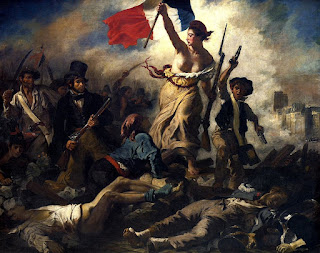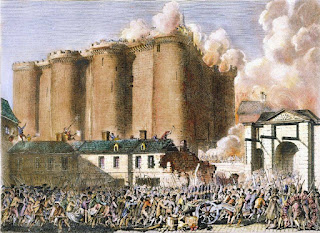Discuss the reasons of French Revolution.
Discuss the reasons of French Revolution.

Q :- Discuss the reasons of French Revolution.
Answer :- The French Revolution (1789 AD) is one of the most important events in the history of the modern world. The revolution that the French residents of France made in 1789 AD declaration is known as the French Revolution in history. The revolution gave articulation to the long pent- up wrathfulness of the French people. chroniclers say that the revolution of 1789 AD announcement was caused by social, profitable and political inequality and wrathfulness.
(A) Economic Reasons :-
Economic distress also paved the way for the French Revolution.
1. Discriminatory Taxation :-
France's first-class clergy and second-class nobility enjoyed most of the land, but they did not have to pay taxes. On the other hand 96% of the total revenue of the government had to be paid to the third community. About half of France's farmland was held by the clergy and nobility. Inspite of huge income from land they did not pay any taxes like tile or land tax, capitation or production tax, vetting or income tax etc. to the government. Despite this they enjoyed various privileges in the state. The state, church and landlords collected various taxes from the third class. Apart from direct taxes such as tile, capitation, vittingem, etc., they also levied on the government gabela or salt tax, tax on consumables, priest's tyde or religious tax, taxes on aids or alcohol, tobacco etc., karvi or unpaid labor on lord's land, use of roads by feudal lords, crop and land. Transfer tax, other additional taxes etc. would have to be paid. After paying various taxes, they would have only 20% of the income. This excessive tax burden made the third community rebellious.
2. Excessive spending by the royal family :-
The excessive spending by the Bourbon royal family in France caused a breakdown in the overall economy of the country. The French royal family weakened the economic power of the state by spending lavishly. During the reigns of Louis XIV (1643-1715 AD), Louis XV (1715-74 AD) and Louis XVI (1774-93 AD), the extravagance and luxury of the royal family, including the emperor, reached its peak. As a result, the French treasury became empty.
3. Attempts to tax the king :-
Due to the luxury of the royal family, heavy spending on war, lack of money in the treasury etc., King Louis XVI of France tried to collect money. To raise this money, he kept imposing new taxes on the poor third class, the cost of which was impossible for the common man to bear. As a result, people become rebellious.
4. Rising prices :-
On the eve of the French Revolution, population growth and inflation caused prices of daily necessities to rise by about 65%, but people's incomes did not rise at that rate. As a result, the life of common people became miserable. Economist Adam Smith noted that before the Revolution, France was a "museum of false economies". Due to the faulty economy, if the prices of goods in the country increase at a huge rate, the poor people face endless misery. The cost of food and other commodities goes beyond the affordability of poor people. On the other hand, the rich bourgeoisie, businessmen, industrialists demanded abolition of tariffs and controls for free and unfettered trade.
5. Expensive wars :-
Louis XIV and XV spent a lot of money on various expensive wars. Then Louis XVI promised aid in the American War of Independence, again spending huge sums of money. As a result, economic crisis occurred in the country.
(B) Political Reasons :-
During the 18th century, France had a centralized autocratic monarchy led by the Bourbon dynasty. In this monarchy, which believed in divine power, the king was the supreme ruler, lawmaker and chief judge of the country. People's opinion had no value in governance. The French Revolution was in fact an expression of long pent-up resentment against the Bourbon monarchy. In eighteenth-century France, the monarch was the supreme ruler of the country in an autocratic monarchy led by the Bourbon dynasty. People had no place in governance.
1. Power of the Aristocracy :-
The power of the aristocracy grew in pre-revolutionary France due to the administrative inefficiency of weak rulers. Dominance of the elite community in the administration created extreme chaos in the governance system. A class of officials called 'intendants' rose to power through corruption. Princes also had the right to arrest and imprison any person without trial by warrant of arrest called 'Letter de Cache'.
2. Weak Rule of Kings :-
The French King Louis XIV was an extreme autocrat. He used to say, 'I am the state'. Its successor, Louis XV, was influenced by his mistress in the conduct of governance. His administrative structure was also not free from corruption. Then the French monarchy faced a difficult situation under the incompetent King Louis XVI. As a result, the weak governance of the kings of France could be said to have prepared the ground for the French Revolution.
3. Inferior Foreign Policy of Kings :-
King Louis XV of France was defeated in the War of the Austrian Succession and the Seven Years' War. As a result, he lost the French colonies in India and America. When King Louis XVI joined the American War of Independence, France's economy was in dire straits. On the other hand, the status of the French monarchy was ruined due to the failure of foreign policy. As a result, people declared rebellion.
4. Role of Louis XVI :-
When the country's economic crisis was acute, King Louis XVI should have dealt with the situation by curtailing the special privileges of the clergy and nobility and imposing a tax burden on them. But he did not take strong action alone and the people were very angry.
5. Flawed laws :-
Eighteenth century French law was highly flawed, complex and incomprehensible. Different types of laws and penal codes were prevalent in different parts of the country. The laws were extremely brutal. Even simple crimes were often punished with death..
6. Corrupt Judiciary :-
The French judicial system was highly complex, expensive and corrupt. Most of the judges were dishonest and corrupt. Corrupt judges used to earn huge money by accepting bribes from criminals, collecting fines etc. Farce in the name of justice was common in the French monarchy. The office of judge was hereditary. The judge was not paid, he suffered fines. Again the king could change the verdict of the trial at will. This final disorganization caused outrage among the people.
(C) Social Reason:-
One of the main causes of the French Revolution was discrimination and exploitation in French society. Classified French society. It was based on the medieval feudal system. Three main classes (estate) existed in French society at this time; Namely - first class (priests), second class (aristocracy) and third class (businessmen, intellectuals, farmers, workers etc.). Among these three classes, priests and aristocracy were the privileged class and the third community was the 'disenfranchised class'.
First Estate :- In the French social system, priests were the first class. Before the revolution they were the beneficiaries and of France. Less than 1% of the total population. Their total number was 1 lakh 20 thousand. But they were in possession of 10% of the total land of France. They did not pay any tax to the king for this land. The priests collected land tax, religion tax, death tax, etc. but refused to pay any other tax to the government except voluntary. But they enjoyed all the facilities of the state and lived a luxurious life.
Second Estate:- In French society, the aristocracy belonged to the second estate. They were about 1.5% of the total population of France i.e. about 3 lakh 50 thousand. But 20% of the total land of France was in their possession. They did not pay any direct tax to the government for land. Again they had exclusive rights in the higher positions of the military and civil departments of the government.
Third Estate :- French society's merchants, farmers, workers, intellectuals, proletariat all belonged to the third estate. Their total population was more than 17% of the total population of France. They had no pedigree in the society. They had to bear most of the tax burden of France. They were victims of inequality everywhere in France. Therefore, the third class people chose the path of revolution to protest against the exploitation, discrimination and oppression of the upper class people of the society.
The above reasons motivated the French people to revolution. Historian Marcel Rainer has said that "the real cause of the French Revolution cannot be understood apart from its social and economic background." Historian Morse Stephens emphasized the economic reasons for the revolution, stating that "the main reasons for this revolution were economic and political—not philosophical and social." The responsibility of the monarchy for the French Revolution cannot be denied. Historian Fischer blames the French monarchy for the revolution. Historian Madela also said that "the French monarchy created the revolution." But in the words of Napoleon - "Arrogance is the root cause of revolution, freedom was only a pretext."

















